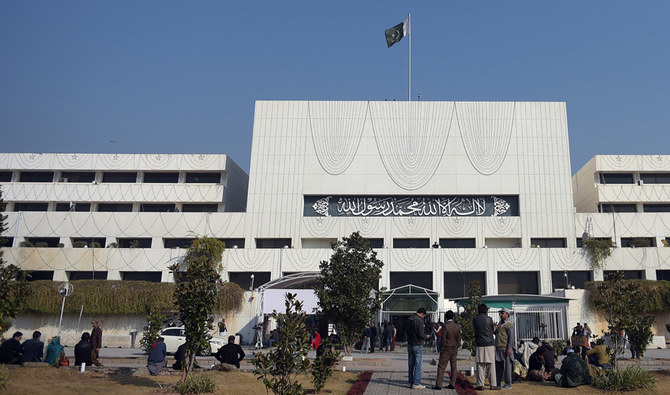ISLAMABAD: The National Assembly, the lower house of Pakistan parliament, on Tuesday passed a bill aimed at condemning and awarding punishment for actions that accounted for the breach of the sovereignty and integrity of parliament, amid a stand-off between the government and the judiciary in the South Asian country.
The development comes as the rift deepens between the government of Prime Minister Shehbaz Sharif and the judiciary over delay in provincial elections and alleged leniency demonstrated to ex-premier Imran Khan, a bitter Sharif opponent, in a number of legal cases.
An alliance of political parties backing the government held on Monday a rare protest outside the Supreme Court building in the Pakistani capital of Islamabad and demanded Chief Justice Umar Ata Bandial step down, accusing him of “bias and misconduct.”
On Tuesday, Rana Muhammad Qasim Noon, who chairs the lower house’s standing committee on rules of procedure and privileges, tabled the “contempt of parliament” bill that was adopted the Nation Assembly.
“A person is said to have committed contempt of Majlis-e-Shoora (parliament) if he is found to have willfully breached the privilege of a member, a House or a Committee, in any manner whatsoever it may be; willfully violated any law guarantying the immunities or privileges of the members; willfully failed or refused to obey any order or direction of a House or a Committee thereof,” read the bill, a copy of which was seen by Arab News.
The bill states that a person is also found guilty if he “refused to give evidence or recorded false statement before a Committee; attempted or influenced a witness either by intimidation, threat or use of force to prevent him from providing evidence, producing document or appearing before the Committee; and failed to provide any documents or submitted tempered documents.”
After the passage of the bill, Noon said it was a historical moment in the parliamentary history of the country.
“It would ensure the supremacy of parliament which was mother of all the institutions,” he was quoted as saying by the state-run APP news agency.
The house through a motion may charge any person for contempt and the speaker or the chairman of the Senate may refer the matter to the contempt committee. The NA speaker shall constitute a contempt committee for the purposes mentioned in the bill within 30 days of its passage. The contempt committee shall comprise 24 members having equal representation from both houses of parliament, the Senate and the National Assembly, according to the bill.
The contempt committee shall have 14 members from the treasury, both from the Senate and the National Assembly, and 10 from the opposition benches. The members shall be nominated by the respective leaders of the house and the opposition.
A political and constitutional crisis has gripped the country since Khan’s PTI party and its allies dissolved provincial assemblies in the Punjab and Khyber Pakhtunkhwa provinces in January. The Supreme Court subsequently ruled that the polls should be held in both the provinces within 90 days of the dissolution of their assemblies, as per the constitution, while the Sharif government insists all elections in the country should be held on the same date in October, when general elections are scheduled.
In defiance of court orders, the government refused to release funds worth Rs21 billion and arrange security in time for Punjab elections on May 14, the date given by the Supreme Court.
Tensions rose further high after the Supreme Court last week declared Khan’s arrest on corruption charges “illegal” and ordered his immediate release amid violent protests by his supporters.



















